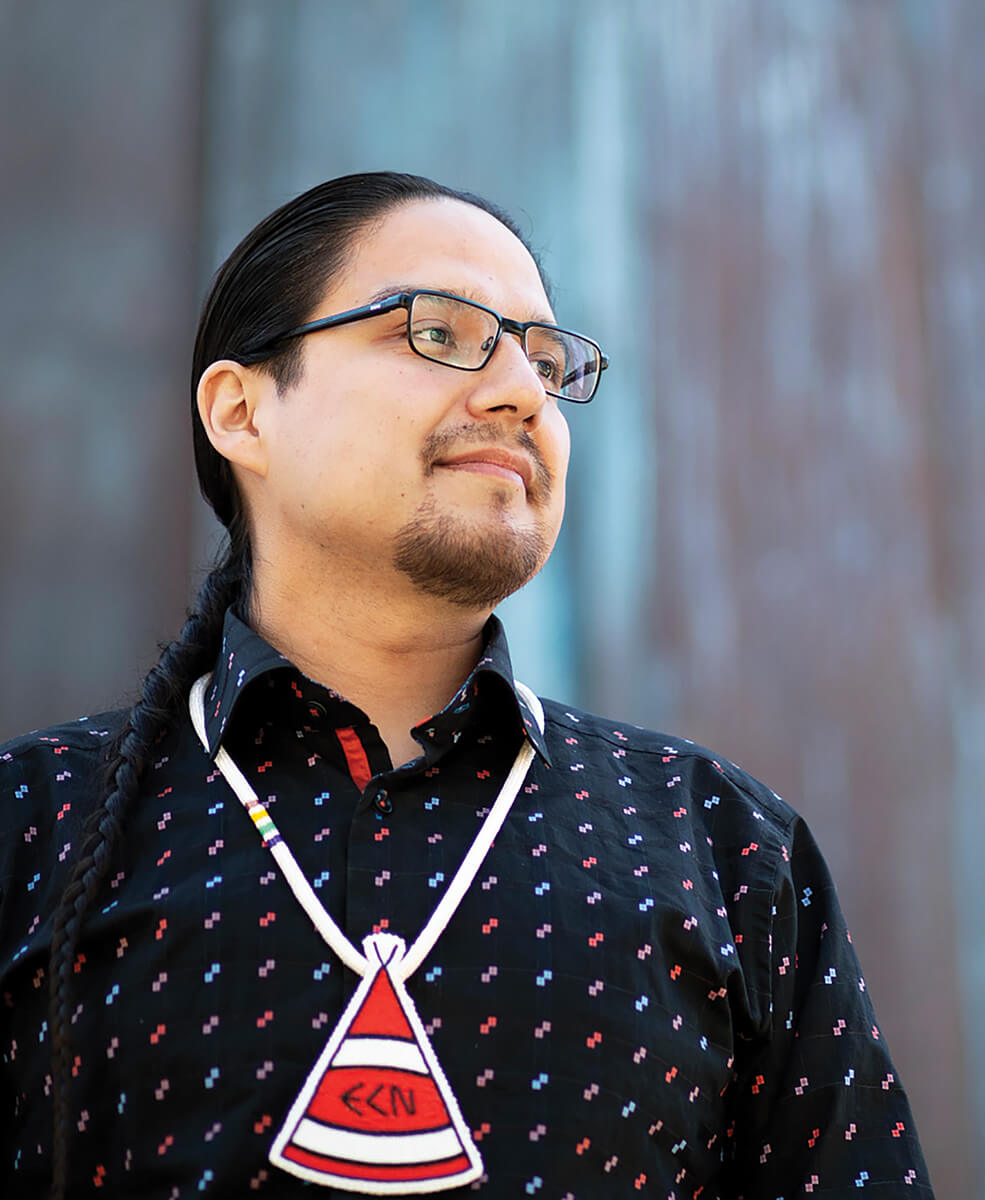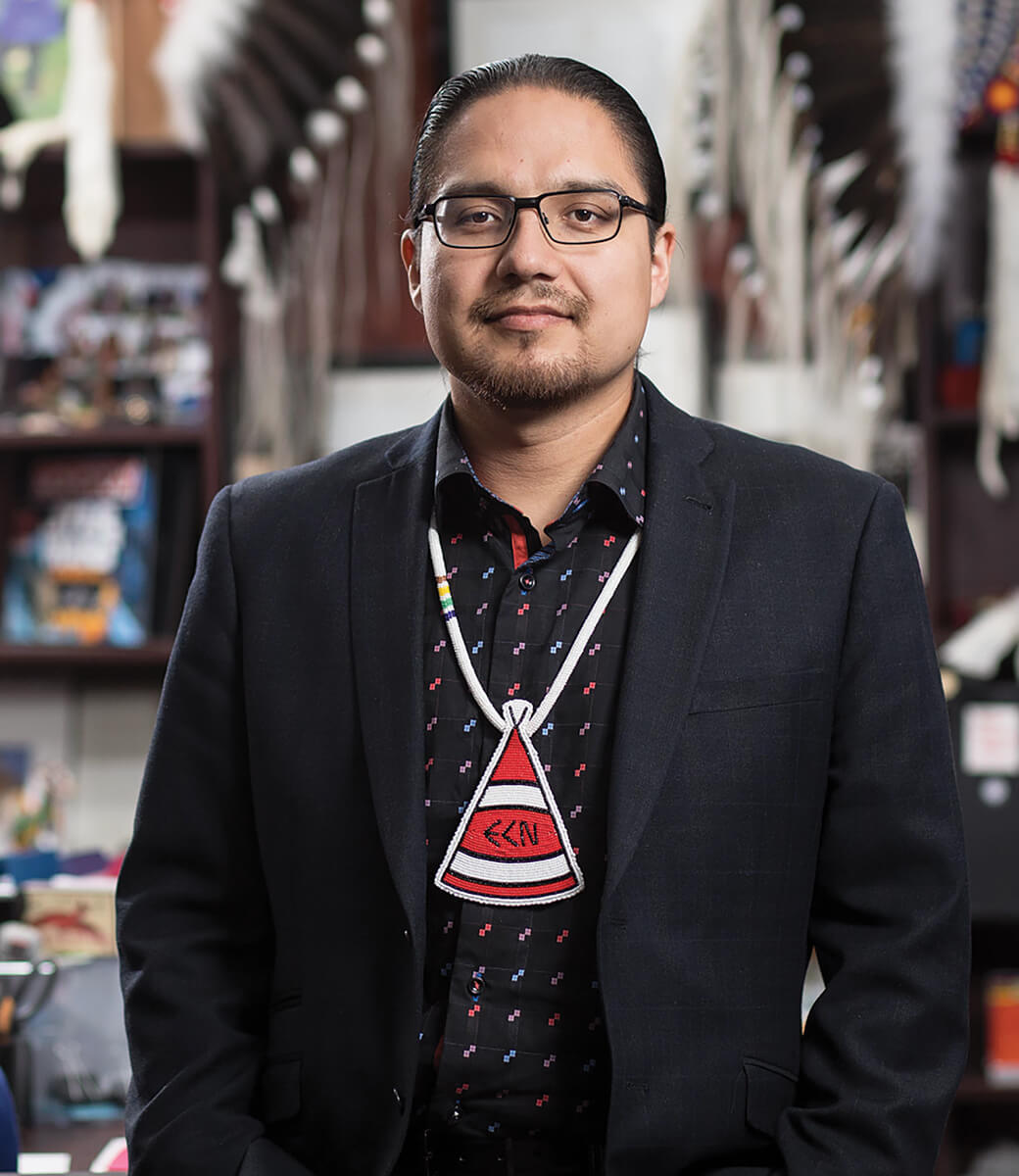
It is quiet and still mostly deserted on the casino side of the River Cree on a cool morning. But in the conference centre at the south end of this popular resort on the outskirts of Edmonton, it appears every meeting room is filled with leaders and organizers from different western Canadian Indigenous nations. Men and women, in roughly equal numbers, grab quick hotel breakfasts from catering tables left in the hallway before they get down to business. One group has traveled in from The Pas, Manitoba, another from a reserve in southern Alberta. William (Billy) Morin, chief of the Enoch First Nation, which owns the River Cree, stands in the doorway of the Strongwoods Room, chatting amiably with a few early arrivals for a local band council meeting about the cost of a new pump house on the reserve, before he steps away to find a vacant room for an interview. He can spare a half hour.
Sporting stylish black specs and a trim goatee, Morin is perfectly at home in a political milieu, pressing the flesh with passersby and discussing issues with a confident, easygoing manner. As well he should. Though only 34, he has already been at this for a while. Morin was elected leader in 2015 at the age of 28 (following two years as band councillor), the youngest chief in Enoch’s modern history. Last year, through the long first act of the pandemic, he also served a term as Grand Chief of Alberta’s Treaty 6 First Nations. “I was appointed by 17 chiefs. Very huge honour, and I’m really thankful for the opportunity,” he says. “But it was a weird year. Coordinating chiefs in reaction to COVID, broadly speaking, was a challenge.”
Morin grew up on the reserve, living there with his parents and three older sisters, but he also views himself an Edmontonian. He went to high school at St. Francis Xavier and is a graduate of the Civil Engineering Technology and Bachelor of Technology Management programs at NAIT. “I’m proud of this town, it’s a good place to live. I sit on the Explore Edmonton board and take that with great pride.”

His focus and priority right now, however, is Enoch, or Maskekosihk, as it’s known in Cree. He’s from the largest clan in this nation of 2,600 (there are about 600 Morins living here), but considers all of those who call the land home family. His traditional name in Cree is Wapikihew, or White Eagle, but Billy Morin IV comes from a long line of tribal leaders. His great grandfather, Billy Morin I, was Enoch’s chief in the 1950s, and his grandfather, Billy Morin II, served on council for many years. “My dad (Billy III) never went into politics, even though he had the total ability to do so,” he says.
Morin wears many hats. He is school board chair, housing board chair, economic development chair and also a member of the River Cree board. “It’s a little bit too much,” he concedes, but nonetheless he remains clear eyed about what he signed up for. “My responsibility is growing the nation and making it better than I found it.”
A big part of that challenge moving forward, and something Enoch has in common with the rest of Alberta, is economic diversification. Maskekosihk’s own oil and gas reserves were mostly depleted by the ‘90s, revenues subsequently replaced by the River Cree which opened in 2006. The casino business has been good, but, “Quite frankly, we’re way too reliant on gaming,” Morin says. “Here we are 15, 16 years later and there are only two commercial properties outside [the casino] to diversify our community. So we’ve been slow to that.”
Morin is committed to expanding his community’s economic base and believes there are opportunities in the field of health, taking advantage of the reserve’s historical setting on Maskekosihk, Cree for “land of medicine,” a sandy piece of geography where many traditional healing plants grow. The chief envisions “a gathering place for health” as he terms it, integrating Indigenous knowledge and practices with complementary elements of western and eastern health care. He has been talking with people in Enoch about ideas for a birthing centre, holistic approaches to seniors’ care, a space for elders to grow medicines, even a research facility for diabetes possibly undertaken in partnership with the University of Alberta. “I do have delusions of grandeur, of maybe someday seeing an Indigenous Mayo Clinic here,” he says. “But we’re going to start small. Right now we’re in the middle of an RFP (request for proposals) for a surgical centre for the province.”
The summer of 2021 was a painful one for the country’s First Nations people, beginning with the searing discovery in late May of the remains of 215 children secretly buried on the grounds of a former residential school in Kamloops. It has prompted searches of similar locations across Canada employing ground-penetrating radar, including two in the St. Albert area. Morin expects that unmarked graves will be found at the site of the former Edmonton Indian Residential School near the Poundmaker’s Lodge, an Indigenous treatment centre, and knows it will be heartbreaking (see our November issue for our feature on this search). “As a young leader, I’m two generations removed from residential schools. My mom and dad didn’t go to residential school but our grandparents did, on both sides of the family,” he says. “There are people here on a never-ending journey of reconciliation and healing, so I need to have some humility and reach out to elders to say I need your help in acknowledging these survivors and this inter- generational trauma for these families who feel like they’ve been left behind.”
But the chief is an optimist. He’s encouraged by the empathy for survivors and their families coming from non-indigenous Canadians since the Kamloops discovery, and sees a similarity to the outpouring of support for the Black Lives Matter movement across lines of race, age, ethnicity and sexual orientation in the United States following the murder of George Floyd by police officer Derek Chauvin in Minneapolis last year. “As much as you read it’s in a bad spot, I think the relationship between Canadians and Indigenous people has so much potential and it will get better.”
Unsurprisingly, as somebody who feels connected to Enoch and Edmonton both, Morin wants to forge bonds between the neighbouring communities. He encourages Edmontonians to come out to Maskekosihk. If they want to explore business partnership possibilities, the nation’s corporate office is always open for a meeting. If they’re looking for personal help or guidance, the elders’ facility next door to the band office welcomes visitors. They can even check out the reserve’s brand new school, which features a world’s first, land-based curriculum centred around nehiyaw pimatisiwin, or traditional Cree culture. “Don’t be afraid to walk into the nation,” Morin says. “Our nation’s motto has to be treaty, which for us means sharing the land, but it’s also selfishly just good for our business to make everybody feel welcome.”
On that note, with a hand extended in friendship and an open invitation to cross the street to Maskekosihk anytime, the chief politely takes his leave. Interview over, he’s just been texted to join another meeting. It’s time to put on another of his hats and go to work.
“Do I want to be chief forever? No,” Billy Morin says with an emphatic laugh. With three sons and a baby daughter this fall, he looks forward to time with his partner Felecia Chalifoux and their family as they grow up. That said, and not just because of his lineage, Morin clearly has politics in his blood.
“My commitment right now is to my nation, but I would say I’m not taking that off the table,” he replies to questions about a future run for office beyond Enoch. Morin is also cagey enough to keep all options open, declining to tip his hand about which party he’d choose or even where he fits on the spectrum from right to left. “I’m really pragmatic at the end of the day. I’m not going to get stuck on left or right or centre. I’d rather build bridges with that group.”
Cody Thomas is a band councillor in Enoch, and was runner-up to Morin (44 votes behind) in the 2019 councillors election held on the nation. Of his former political rival, he offers: “He and I have had disagreements and we’ve agreed to disagree at times.” Morin, for instance, was one of the chiefs in the province who strongly endorsed the Alberta Indigenous Opportunities Corporation launched by the UCP government in the fall of 2019 as a source of support for First Nations investment in the energy sector, including projects like the controversial Trans Mountain Pipeline. Though Thomas is not opposed to pipelines, he would like to see greater due diligence and more engagement with First Nations on issues of safety and environmental protection before they go ahead.
But ultimately, Thomas supports Chief Morin’s drive and dedication to doing what he feels is best for his people as they move deeper into an increasingly uncertain century. “He’s a big believer in our youth, and in our seven-generation principle,” Thomas says. “I think he’s a visionary, honestly.”
This article appears in the December 2021 issue of Edify







